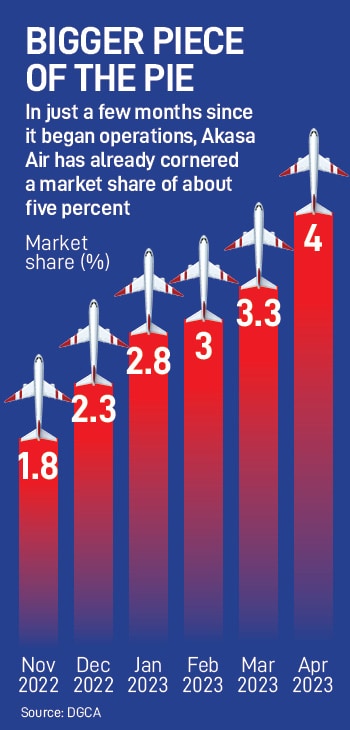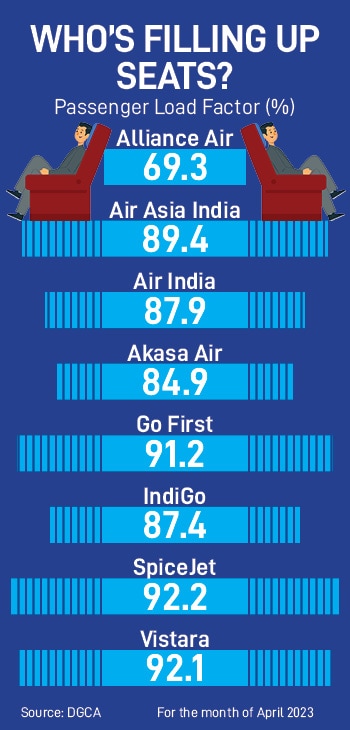An industry veteran with stints at Delta Air Lines and American Airlines, Dube relocated to India from the US in 2017 to join Jet Airways as its CEO. The Mumbai-headquartered Jet Airways, which in many ways had redefined the way millions of Indians took to the skies, was India’s second-largest airline with a nearly 20 percent share of the domestic market at that time.
Two years into his tenure, Jet Airways folded up, largely due to its mounting debt, prompting Dube to resign a month after the airline operated its last flight in April 2019.
A short stint as the CEO of the now-troubled Go First followed in 2020, after being brought in as an advisor in October of 2019. But, ill-timed as it could get, Dube took charge of the airline in February as the global economy, and more specifically the global aviation sector, went into a tailspin as Covid-19 wreaked havoc. For almost two months, air traffic in the country came to a standstill and by August of that year, Dube had resigned from Go First.
“It was frustrating not being able to work for an airline that I thought had a professional and empowered management team, which was based in Mumbai," Dube tells Forbes India. “Working out of Delhi was not an option for me and my family."
That meant he had to take things into his own hands. His nearly three-decade experience in the aviation sector across the US and India meant that he knew the underlying potential for air travel in India. After all, India is expected to add over 2,200 aircraft in the next 20 years as travel demand grows on the back of a thriving economy.
“I wanted to create an airline that I could work for in Mumbai, with a professional and empowered management team where we could build it from scratch focussing on cost leadership, service excellence, employee centricity, and a dispassionate non-controlling capital structure to make sure it is well-capitalised," Dube says.
By November 2021, Dube set up SNV Aviation Limited, perhaps an abbreviation for Sanjay, Niraj and Vinay, which owns India’s newest airline, Akasa Air. The three Dube brothers are all listed as co-founders of Akasa Air, which received investments from the late Rakesh Jhunjhunwala, who was often referred to as the Big Bull of India’s stock market. Aditya Ghosh, the former president of IndiGo, is also a co-founder at the company.
![]()
“If you look at where aviation is going in India, we"re just going to grow and grow," Dube says. “We"re going to get 2,000 more aircraft here in the next 15-20 years. And when you have that kind of exciting growth in aviation that doesn"t have much to do with airlines but just with the economic engine that we"re creating, the thought was the construct of another airline with the very simple characteristics done right from day one, that could be enduring and profitable.
In August 2022, the Mumbai-headquartered airline of which Dube is also a co-founder and the CEO, took on its maiden journey between Mumbai and Ahmedabad. Since then, the airline has been on a flight path unlike any airline in the history of Indian aviation, or perhaps even globally.
In just nine months since it began operations, Akasa Air has already cornered a market share of about five percent, while adding a record 19 aircraft to its fleet. That’s the fastest any airline has managed, both in terms of market share and fleet size, since India opened up its aviation sector to the private sector in the early 90s. The recent troubles at GoAir also crucially added to Akasa Air’s market share even though Dube maintains that market share isn’t something that the airline is actively chasing.
“We had set ourselves an incredibly difficult task that no airline in the 120-year history of global aviation had ever done, which was to go from zero to 20 aircraft within 12 months," the bespectacled CEO of Akasa Air says. “Many fast-growing companies are forced to make trade-offs but we’ve managed the growth with reliability, customer satisfaction, and employee centricity. We couldn’t have predicted that we would get there."
With 20 aircraft, Akasa Air can start flying internationally. Of course, rules have now been relaxed and airlines don’t need to mandatorily operate for five years in addition to 20 aircraft before it can start flying on international routes. Yet, the ramp-up of its fleet size is unprecedented. An aircraft from Boeing is expected in the next 45 days, which means, in all likelihood, as it celebrates one year of its operations, it will start flying internationally.
“As for the routes it’s going to be the Middle East, Southeast Asia, Nepal, Sri Lanka, Bangladesh, and more of the usual routes that we would fly to begin with," Dube says. “I wouldn’t look at anything exotic."
“Without a doubt, they have done a remarkable job so far," Vinamra Longani, the head of operations at Sarin & Co, a law firm specialising in aircraft leasing and finance says. “Despite slot constraints at key metro airports, they have managed to build a sizeable network connecting key cities. Now, with the 20th aircraft coming in and depending on how quickly they take delivery of subsequent aircraft, they will face the same constraints at a larger level. Should Go First not return, slots from their portfolio if reallocated may address some of these concerns."
Different Thinking
In many ways, the spectacular growth in recent times, is also a result of a focussed and realistic approach to flying that Dube and his team are pursuing. And he is clear about one thing, aviation isn’t a glam business.
That’s also why, even as Go First went ran into headwinds, Akasa Air is not focussed on ramping up capacity to capitalise on the demand and supply mismatch, especially during the ongoing peak travel period. “When airlines try and stretch beyond their limits, and have knee-jerk reactions to get a little bit of share and don"t operate in a disciplined manner, that"s when things go horribly wrong," Dube says. “There"s not a single aircraft that we are going to take out of order ahead of time."
![]() The delivery expected in the next few days is only the 20th of the 72 aircraft that it ordered in 2021, close on the heels of the US FAA (Federal Aviation Administration) approving the Boeing 737 Max to return after being grounded for more than a year following separate crashes. “The reason we planned it that way was that when you go from zero to 20 aircraft very, very quickly, we want to make sure there"s no other unintended consequence that happens. The deliveries were planned in a particular manner and we"re going to stick to that."
The delivery expected in the next few days is only the 20th of the 72 aircraft that it ordered in 2021, close on the heels of the US FAA (Federal Aviation Administration) approving the Boeing 737 Max to return after being grounded for more than a year following separate crashes. “The reason we planned it that way was that when you go from zero to 20 aircraft very, very quickly, we want to make sure there"s no other unintended consequence that happens. The deliveries were planned in a particular manner and we"re going to stick to that."
That means not chasing short-term gains, particularly market share, which can cost heavily in the long run, and instead, a focus on what Dube reckons is building an airline in which generations can take to skies. In India’s aviation history, barring Air India, and Indian Airlines (which later merged with Air India), no other airline has survived three decades of operations. Jet Airways, which began operations in 1994 was the second longest surviving airline in India before it shut down operations in 2019. All the other incumbent airlines began operations only after 2000.
“When you are giving yourself this degree of difficulty of being the fastest growing airline in history, it"s typically the sanctity of the operations that could feel some unintended pressures like degradation of on-time performance or higher cancellation rates or lower technical dispatch reliability," Dube says. The airline has consistently clocked on-time performance between December and April this year. As of April this year, it has a 94 percent on-time performance across the country’s four metro airports, followed by Air India, which is also attempting an incredible turnaround under the Tata Group.
“Everything that we are building is with the intention of creating a durable airline that our grandchildren will enjoy," Dube says.
That’s also perhaps why, Dube is very clear that the airline, despite being a start-up, is being operated and run on par with some of the top global companies in the world, with a professional and empowered management team. “Some airlines in the past have had professional management teams that haven"t been empowered," Dube says. “This is not a glam business. This is a hardcore business of operations, numbers, financial prudence, cost management, liability, and focus on your employees. It has every facet highly driven by technology and you need to have a management that is driving the airline at every moment in time.
“Akasa’s growth coincided with the tail-end of Covid, and within a marketplace that was still relatively weak, allowing it to exploit the situation and claw a sizeable chunk," says Shukor Yusof, founder of Malaysia based aviation consultancy Endau Analytics. “The cash outlay has been well-projected and budgeted. Plus, the carrier came at an opportune time. The growth in Indian aviation market post-Covid has overtaken all other Asian countries, including China. Of course, there remains structural issues at airports as well as the persistently high jet fuel prices in India.
Still, there are some concerns surrounding the slow delivery of aircraft. “Akasa has not been


 The delivery expected in the next few days is only the 20th of the 72 aircraft that it ordered in 2021, close on the heels of the US FAA (Federal Aviation Administration) approving the Boeing 737 Max to return after being grounded for more than a year following separate crashes. “The reason we planned it that way was that when you go from zero to 20 aircraft very, very quickly, we want to make sure there"s no other unintended consequence that happens. The deliveries were planned in a particular manner and we"re going to stick to that."
The delivery expected in the next few days is only the 20th of the 72 aircraft that it ordered in 2021, close on the heels of the US FAA (Federal Aviation Administration) approving the Boeing 737 Max to return after being grounded for more than a year following separate crashes. “The reason we planned it that way was that when you go from zero to 20 aircraft very, very quickly, we want to make sure there"s no other unintended consequence that happens. The deliveries were planned in a particular manner and we"re going to stick to that."